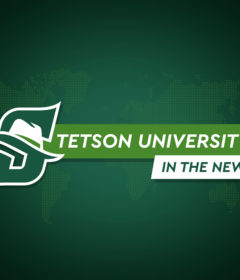Stetson’s accreditation reaffirmed by SACS
The Southern Association of Colleges and Schools Commission on Colleges has reaffirmed the accreditation of Stetson University for another 10 years. The reaccreditation was announced by SACS last week following a two-year, in-depth review of the university and visit by a SACS team in April.
“We are very proud of our successful reaccreditation by SACS,” said Stetson University President Wendy B. Libby. “This is recognition of the outstanding work at Stetson in meeting the requirements for accreditation and in developing a Quality Enhancement Plan to improve student learning outcomes and retention and graduation rates.”
“Student success is Stetson’s top priority, and our commitment to continual improvement is a vital part of the university – something the Commission noted,” Libby said. “I would like to thank and congratulate the faculty, administrators and staff members at all four Stetson locations across central Florida who were involved in the SACS review process.”
Stetson has been accredited by SACS, the regional body for the accreditation of degree-granting higher education institutions in the southern states, since 1932. To maintain accreditation, a university must undergo a rigorous internal review every 10 years. The institution must demonstrate its continued commitment to a variety of comprehensive standards related to governance and administration, library facilities, faculty, student affairs and services, academic programs, institutional effectiveness, financial resources, physical resources and institutional mission, as well as to federal regulations governing universities. More information about SACS accreditation is available at www.sacscoc.org.
“Stetson received no follow-up recommendations, which is rare and quite an accomplishment,” said Dr. Raymond Barclay, Stetson’s director of Institutional Research and Planning.
As part of the reaccreditation process, Stetson defined and developed a Quality Enhancement Plan that enhances students’ transitions into and through Stetson – with the goal that students will be more successful in their college studies and in their lives after graduation.
The plan has two major initiatives: Hatter Trek and Hatter Quest. Hatter Trek is a summer transition program that involves conducting voluntary retreats for incoming students in the months before they begin at Stetson in the fall semester; the first Hatter Trek was held in summer 2011. Hatter Quest is a thoroughly revised approach to fall orientation for all incoming students. Starting this fall, first-year students began their First Year Seminar course during orientation and finished that class before Thanksgiving – allowing them to focus on their three other courses for finals. Both initiatives are part of Stetson’s new focus on student success.
Stetson’s next formal report to SACS will be a Fifth-Year Interim Report – in 2016 – addressing the effectiveness of the new Quality Enhancement Plan and a few of the required standards that overlap with federal regulations from the U.S. Department of Education and the Higher Education Reauthorization Act.
“We take seriously our charge to develop the QEP and assess its success and know we must be diligent about issues related to institutional effectiveness, particularly the assessment of learning, continuous improvement, and integrated planning and budgeting,” Barclay said. “We will continue to push ourselves on these two fronts to maintain or exceed those standards.”



